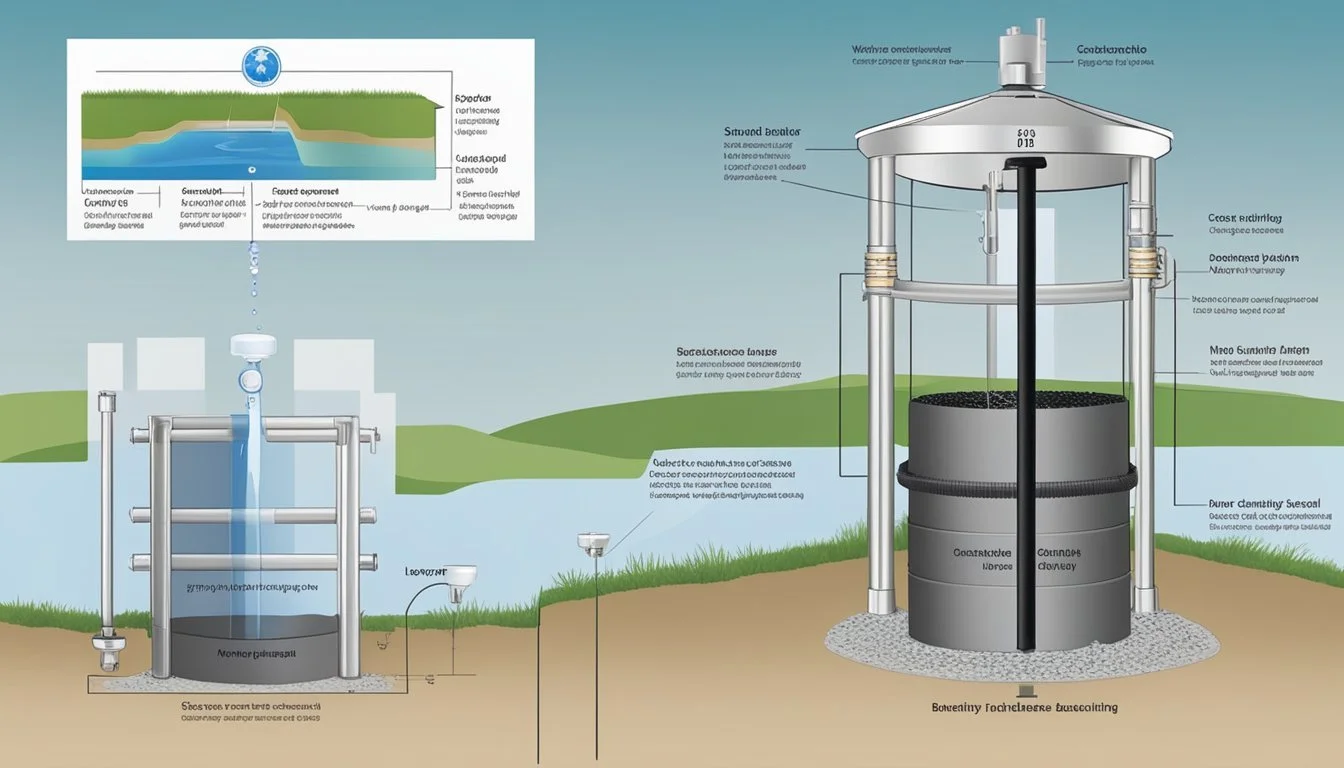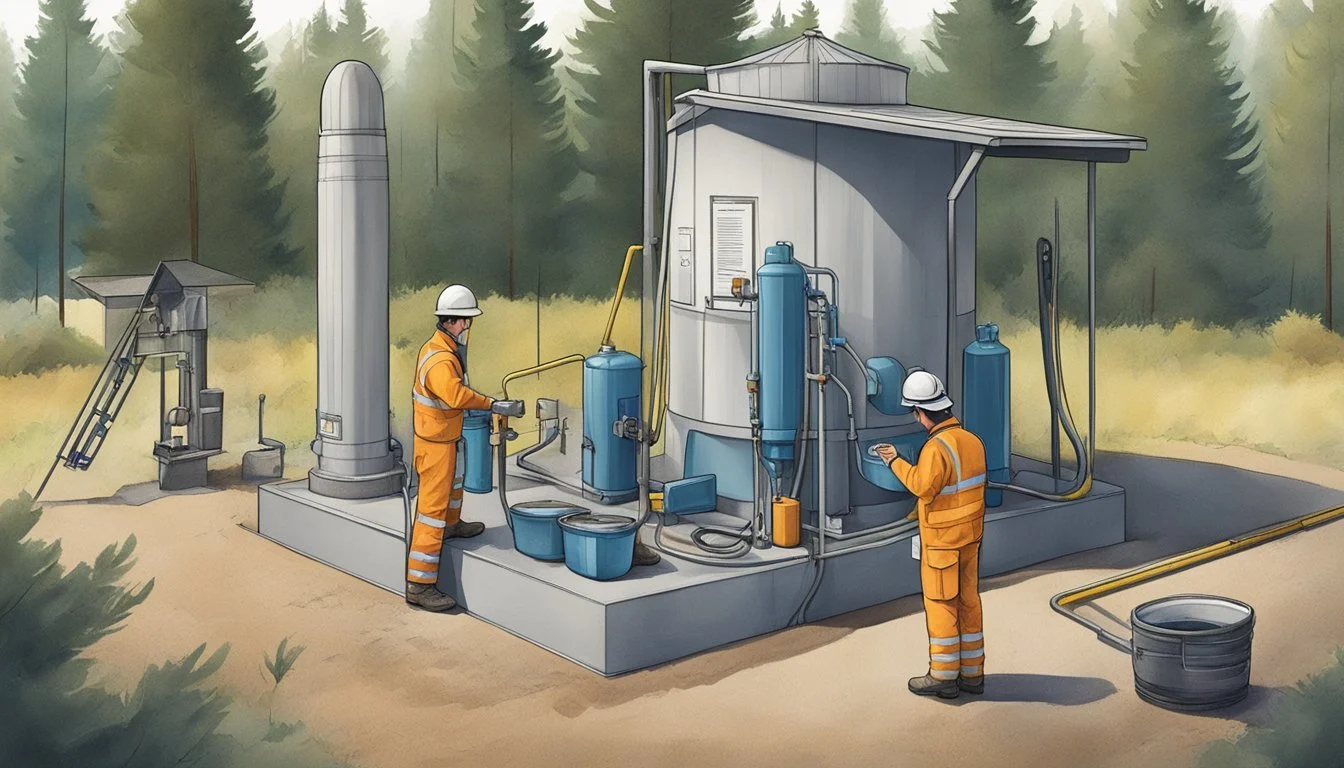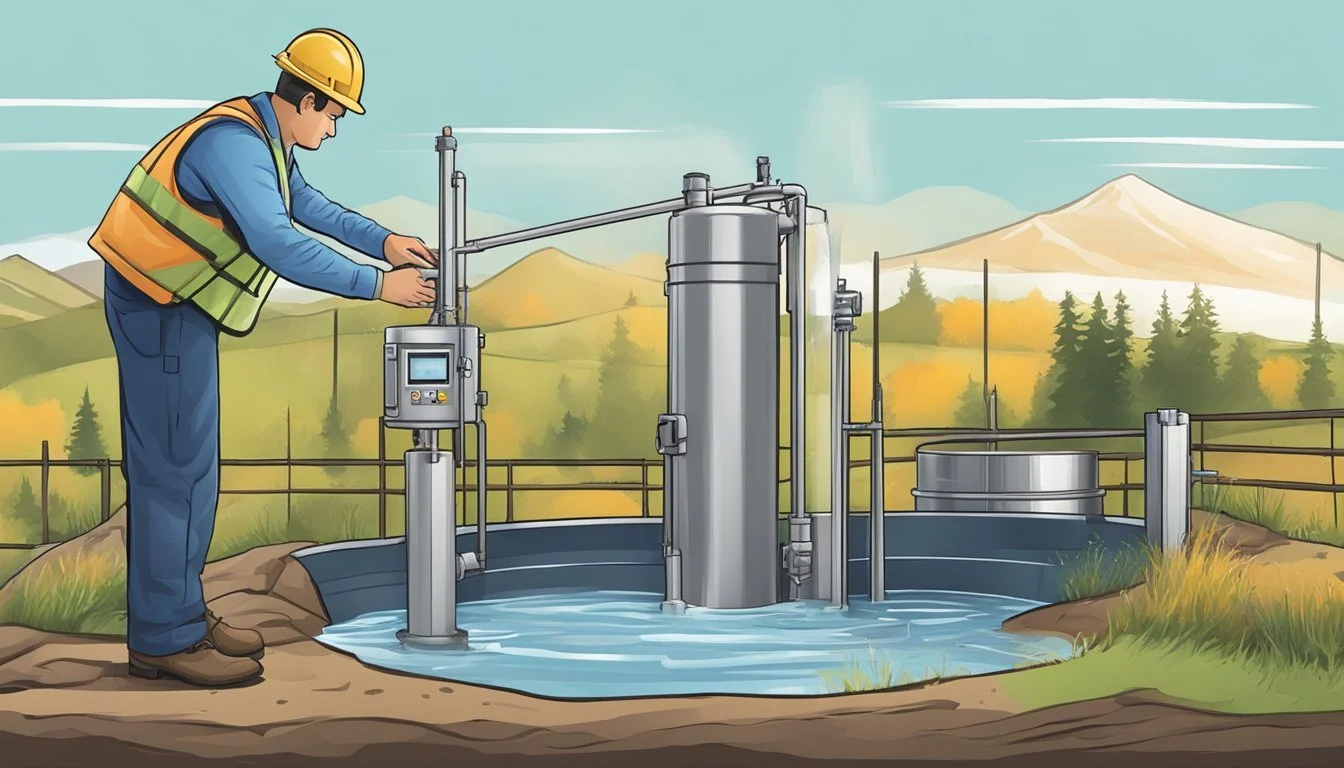Oregon Water Well Regulations
Understanding Legal Compliance for Well Owners
In Oregon, managing and protecting groundwater resources is taken seriously due to its vital role in supporting both urban and agricultural needs. The state has established specific regulations that govern the construction, operation, maintenance, and eventual decommissioning of water wells to safeguard these precious resources. These regulations are designed to prevent groundwater contamination, preserve artesian pressure, and minimize wastage. They apply not only to individual and commercial well owners but also to water supply well constructors who are expected to adhere to high standards of practice.
Navigating through the complexities of Oregon's water well regulations requires an understanding of the various requirements set forth by the state's Water Resources Department. Well construction and compliance are overseen by the Well Construction and Compliance Section, which ensures that all groundwater extraction methods are in alignment with the state's water laws. This includes obtaining necessary permits, adhering to construction standards, and following proper well abandonment procedures when a well is no longer in use.
Landowners looking to construct their own water supply wells must navigate a series of authoritative measures which include permit applications, fees, and bonds or letters of credit. This ensures that any action taken on their property regarding water wells is up to par with environmental and safety standards. The details around these measures are specified by the Water Resources Commission, emphasizing the state's commitment to responsible water well management.
Water Well Regulatory Framework in Oregon
In Oregon, the Water Resources Department (WRD) plays a pivotal role in ensuring the proper construction, alteration, maintenance, and decommissioning of water wells. They aim to prevent contamination, loss of artesian pressure, and waste of groundwater. The Oregon Health Authority (OHA) collaborates with the WRD, contributing to the oversight of drinking water services and the Domestic Well Safety Program.
The regulatory framework also involves the Oregon Secretary of State, where administrative rules are codified. For example, regulations concerning public water systems fall under OAR Chapter 333 Division 061, last amended in February 2023. These rules address:
Purpose, Scope, and Adoption by Reference: 333-061-0005; 0010; 0015
Definitions: 333-061-0020
Moreover, the Water Resources Commission empowers the WRD to license water well constructors, ensuring they abide by state regulations. This is key for upholding the quality and safety of water supply wells.
The construction standards set by the state are detailed in OAR Division 210, providing specifications for various well types, including artesian and filter pack wells. It's vital for contractors and well owners to adhere to such standards to ensure integrity and functionality of wells.
In summary, Oregon's water well regulations are a collaborative effort between multiple entities, meticulously structured to protect and manage the state's vital groundwater resources.
Overview of Well Construction Standards
Oregon's well construction standards are rigorous to ensure the integrity of water wells and the protection of underground water resources. These regulations cover all aspects from permitting to the physical construction requirements.
Construction Requirements
The construction of water wells in Oregon must adhere to specified standards to prevent contamination and ensure safety. Well Construction Standards specify that all methods of well construction must follow procedures for placement, use of explosives, hydrofracturing, and handling of mineralized or contaminated groundwater among others, ensuring that wells are built to preserve artesian pressure and prevent waste.
Permitting Process
Individuals seeking to construct a well must obtain a well construction permit from the Oregon Water Resources Department. The permitting process involves the payment of a permit fee and submission of detailed plans for the well, providing transparency and adherence to state regulations.
Role of the Oregon Health Authority
The Oregon Health Authority plays a pivotal role in securing a safe drinking water supply. They oversee aspects of well construction that affect public health, including contamination prevention and the operation and maintenance of wells to ensure that they meet health standards.
Water Resources Department Responsibilities
The Water Resources Department is responsible for a breadth of activities, from the issuance of permits to the oversight of well decommissioning. Their responsibilities ensure proper well construction, compliance of rules, and that construction of wells meets both environmental and safety standards, contributing to sustainable groundwater management.
Water Quality and Safety Measures
Ensuring the safety and quality of water from wells in Oregon is crucial due to the potential health risks associated with contamination. Specific regulations and testing protocols are in place to address arsenic and nitrate levels, among other contaminants.
Contamination and Health Risks
Contaminants in water wells can pose significant health hazards to consumers. Potential sources of contamination include agricultural runoff, industrial waste, and natural mineral deposits. Exposure to certain contaminants can lead to serious health issues, emphasizing the importance of regular water quality assessments.
Arsenic and Nitrate Levels
Arsenic and nitrate are two contaminants of particular concern in Oregon. Both are naturally occurring elements; however, elevated levels can be harmful. Arsenic is linked to skin damage, circulatory system problems, and an increased risk of cancer, while high nitrate levels can cause conditions like methemoglobinemia in infants.
Testing and Treatment Protocols
To safeguard public health, water from wells must be routinely tested for contaminants, including arsenic and nitrate. In cases where levels are high, water treatment methods such as reverse osmosis or ion exchange may be employed to reduce concentrations to safe levels. The Oregon Health Authority's Testing Recommendations provide detailed guidelines on the testing process.
Regulations for Public Water Systems
Public water systems in Oregon are governed by stringent regulations to ensure the safety of drinking water. These regulations dictate construction standards, monitoring requirements, and reporting obligations for systems using groundwater. For example, public water systems must comply with legislative requirements as specified by the Drinking Water Regulations and Rules to implement certified wellhead protection programs.
Well Maintenance and Support Services
In managing Oregon's water wells, routine maintenance and effective customer support play crucial roles. They ensure long-term water quality and supply, address common well issues efficiently, and maintain compliance with state regulations.
Routine Maintenance and Inspection
Regular inspection and maintenance are essential for water well longevity and performance. The Oregon Health Authority's Domestic Well Safety Program emphasizes the importance of consistent checks for signs of wear, contamination, or mechanical failure. Well owners are advised to conduct at least annual evaluations of their water systems.
Customer Support Infrastructure
The Oregon Water Resources Department has established a robust customer support infrastructure. Landowners can obtain well ID labels during property transfers and access well reports through the Department's repository. For queries on well water quantity or construction requirements, the Department provides guidance and support.
Addressing Well Water Issues
When well water issues arise, identifying possible causes is critical. Contaminants or mechanical faults can affect water quality, which may necessitate various remedies. Regulations from the Oregon Water Resources Commission detail procedures for sanitation, and repairs, such as the Maintenance, Repair, and Deepening of Water Supply Wells, ensuring safe and reliable water.
Compliance and Enforcement
Oregon takes its water resources seriously, ensuring through stringent regulations that the state's groundwater is safe and sustainable. The Well Construction and Compliance Section oversees the proper construction, alteration, and maintenance of water wells.
Regulatory Compliance
Compliance with Oregon's well construction standards is critical for protecting groundwater. These standards encompass a broad range of requirements, from the design and installation of water wells to their maintenance and eventual decommissioning. Licensed water well constructors in Oregon must adhere to the rules established under ORS 537.747, which mandate consistent inspections and precise construction protocols to prevent contamination and ensure the longevity of the water wells.
Enforcement Measures by the Oregon Department of Environmental Quality (DEQ)
The Oregon DEQ plays a pivotal role in enforcement when these standards are compromised. With the authority to issue civil penalties and Department Orders, the DEQ ensures compliance through systematic enforcement measures. Civil penalties are calculated based on criteria detailed in the Oregon Administrative Rules Chapter 340, Division 12, taking into account the severity and nature of the non-compliance. This structured approach reinforces the importance of adhering to regulations and maintains statewide consistency in water well management.
Real Estate and Water Well Disclosures
When engaging in a real estate transaction in Oregon, it's imperative to be aware of specific regulations regarding domestic wells. Compliance with these regulations ensures the safety of drinking water and provides transparency to potential property buyers.
Disclosure Requirements in Real Estate Transactions
Oregon law mandates that in any real estate transaction involving property with a domestic well, the seller must ensure the water source is adequately tested. The tests must screen for arsenic, nitrates, and total coliform bacteria before the sale can proceed. Relevant information regarding these regulations can be found at the Oregon Health Authority's Well Testing & Regulations page.
Sellers are required to share the results of these tests with potential buyers, typically through a Real Estate Transaction (RET) form, which provides a summary of the well's condition and ensures that the buyer is fully informed of the quality of their water supply.
Domestic Well Testing
The Domestic Well Testing Act outlines the procedures for testing. Tests should be conducted by accredited laboratories to ensure accurate results. The main components tested in a domestic well include:
Arsenic: Can cause skin damage or circulatory system problems and may increase the risk of cancer.
Nitrates: High levels can be especially harmful to babies and pregnant women.
Total Coliform Bacteria: Presence can indicate the infiltration of waste into the water supply and potential for harmful pathogens.
For the details on the testing process and the state's involvement, property owners and buyers should refer to resources such as the Department of Environmental Quality's Resources for Private Well Owners.
Maintaining compliance with these regulations is vital for the protection of public health and the integrity of Oregon's real estate market.
Applications and Documentation
The regulatory landscape for water well construction in Oregon requires meticulous adherence to application processes and the safeguarding of documentation within its systems. This ensures compliance with state regulations and protects vital information related to water resources.
Well Construction Permit Applications
In Oregon, individuals or entities seeking to construct water wells must first obtain the necessary permits, which are managed by the state's Water Resources Department. Applications for well construction permits are detailed, necessitating thorough documentation, including the proposed location, purpose, and construction methods of the well. Applicants must collaborate with licensed well constructors whose credentials are verified against the standards enforced by state regulations. Once submitted, these applications are reviewed for compliance with environmental standards and public resource management goals.
Key points for Well Construction Permit Applications:
Necessity for Permit: Mandatory for well construction.
Application Details: Includes location, purpose, construction details.
Constructor Credentials: Verification of well constructor licenses.
Review Process: Compliance with environmental and resource management standards.
Cyber-Security Measures for Application Systems
Cyber-security holds paramount importance within Oregon's state application systems. The Corporation Division, Archives Division, and the Elections Division stand as testaments to the state's commitment to protecting sensitive information, which includes water well documentation. Rigorous cyber-security protocols are implemented to ensure that the integrity of applications is maintained and that sensitive data is shielded from unauthorized access. Regular updates and security audits are conducted to keep the systems robust against evolving cyber threats.
Key points for Cyber-Security Measures:
Importance: Protection of sensitive information and system integrity.
Protocols Implemented: Rigorous measures against unauthorized access.
Ongoing Maintenance: Regular updates and security audits for continual defense.
Public Resources and Information
When navigating Oregon's water well regulations, residents and professionals have access to a range of public resources and information. These resources include comprehensive records and a variety of educational materials designed to assist with the understanding and compliance of well construction and maintenance.
Access to Water Well Records
The state of Oregon maintains detailed water well reports which are readily accessible to the public. Interested parties can search for and retrieve records through the Oregon Water Resources Department's well report query system. This system provides documentation on water supply well locations, construction details, and well depths, equipping well owners and contractors with necessary information for responsible well stewardship.
Educational Materials and Resources
For those seeking guidance on well management, the state offers a variety of educational materials and resources. The materials cover crucial topics such as:
Groundwater protection
Well operation and maintenance
Safe drinking water supply
Additionally, The Oregon Health Authority's Water Well Handbook serves as an important tool. It outlines the legal framework governing water wells, including specifics on water well construction, operation, maintenance, and abandonment. This handbook is an essential resource for anyone involved in water supply well construction or maintenance in Oregon.
Frequently Asked Questions
This section addresses some common inquiries regarding water well regulations in Oregon, providing clarity on legal, safety, and construction mandates.
What are the legal requirements for water well construction in Oregon?
In Oregon, water well construction must comply with specific standings detailed by the Oregon Water Resources Department. These include adherence to well construction standards to ensure that groundwater resources are protected.
How often must well water be tested in Oregon to ensure safety?
While there are no state-imposed testing schedules, well owners are encouraged to test water annually. More frequent testing may be necessary if changes in taste, odor, or appearance are noticed. Guidance can be found through the Oregon Health Authority's Domestic Well Safety Program.
What is the minimum distance required between a new well and the property boundary in Oregon?
Oregon regulations specify minimum distances for new wells from various features, including property boundaries, to prevent contamination. Such distances can be verified with local authorities as they may be subject to change or further specification.
What permits are needed to drill a water well in Oregon?
Drilling a water well in Oregon requires a water right permit from the Oregon Water Resources Department, unless the well is exempt from water right permitting. A licensed well driller must also be used for the construction.
What are the responsibilities of water well owners in Oregon?
Water well owners in Oregon are responsible for maintaining their wells in a condition that prevents contamination. This includes proper construction, regular inspection, maintenance, and testing. Owners must also ensure their wells are registered and constructed by a licensed professional.
How do I interpret water table maps for well placement in Oregon?
Interpreting water table maps requires understanding the local aquifer characteristics and seasonal fluctuations. These maps are essential for determining potential well yields and avoiding dry wells or areas with potential for contamination. Additional resources can be found through Oregon's water management agencies.








